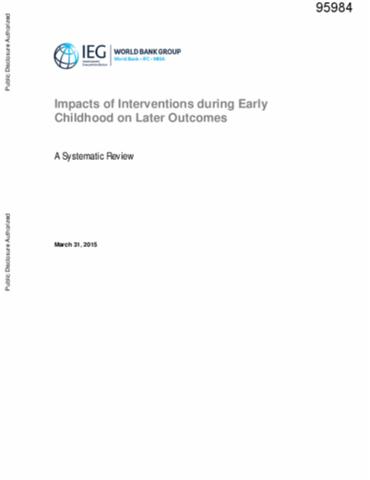Impacts of Interventions during Early Childhood on Later Outcomes : A Systematic Review

Date
2015-04Author
Tanner, Jeffery
Candland, Tara Lynn
Odden, Whitney Swan
Metadata
Show full item recordAbstract
The economic rationale for investing in young children goes beyond improving quality of life during childhood. It hinges on the belief that the benefits of these investments persist into school age and beyond. This report is the first systematic review of causal evidence to investigate this belief, partly because an increasing number of early childhood development (ECD) studies have now matured to allow closer examination. By collecting into one place those studies that provide high-quality causal estimates, the report takes an outcome-based approach to analyzing the post-early childhood effects of early childhood interventions. It serves three important functions. First, it provides analysis on early childhood interventions whose sustained effects have been evaluated across six areas of human development. Second, it examines impact evaluation evidence over time and its effect on shared prosperity through impacts on subpopulations. Finally, the review aims to improve the quality and coverage of ECD knowledge by discussing commonly observed evaluation challenges and identifying research gaps. Four important findings derive from this effort: 1. Early childhood interventions can, but do not always, lead to benefits later in life in the areas of cognition, language, education, and the labor market. Evaluated interventions have not demonstrated consistent longterm advantages for physical development, although these outcomes are less salient to adult welfare. 2. Gender-neutrality dominates outcomes, but schooling does tend to improve for girls, the poor, and those who are in quality preschool and supplemental feeding programs for longer. 3. To take advantage of the window of opportunity from conception to the child's second birthday and achieve sustained effects beyond early childhood, nutrition interventions may need to be in place throughout and beyond these first 1,000 days. 4. Sizeable knowledge gaps persist but can be closed with careful planning and design. Early childhood development holds considerable promise for making progress on the World Bank’s dual objectives of reducing poverty and increasing shared prosperity while encouraging economic growth. More investment and evaluation are required to enable interventions, and the children they serve, to realize their potential.
